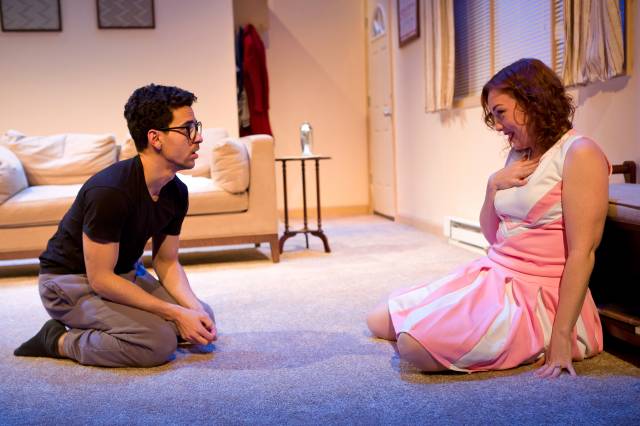

After only a few moments observing the Beaumont household in Ross Howard’s No One Loves Us Here (from New Light Theater Project), you realize you’re being asked to cast aside expectations about plausible human behavior. Washington (Anthony Michael Irizarry), a young employee from a local video store (is this a period piece?), arrives at the Beaumonts’ affluent home, ostensibly to retrieve unreturned DVDs so that the couple will avoid a late fee. Washington scarcely has a chance to take in his surroundings before he is (1) drawn into a plot by Mr. Beaumont (Christian Ryan) to murder Mrs. Beaumont (Jessica Kitchens), (2) extended a double-suicide proposal by Mrs. Beaumont, and (3) invited to occupy the couple’s guesthouse. Washington agrees to move in without even a cursory look-see at his new quarters.
British playwright Howard seems to be going for a scathing satire of upscale middle-class American mores and hypocrisies — a familiar literary aim, of course. Subtle references to Washington’s Native American heritage suggest the whole thing is meant as some sort of absurdist allegorical commentary on America itself. In any case, the play’s tone wobbles, and — especially in the second act — Howard relies too heavily on outrageous comic violence and facile irony. For instance, he at least twice makes the point that the monstrous Beaumonts are regular churchgoers.
Howard and his director, Jerry Heymann, nonetheless have a talent for weaving a disturbing yet beguiling theatrical spell. Hints of menace in the play sometimes seem outright Pinteresque. The script is studded with nicely eerie touches, such as the periodic ringing of a cordless phone, left unanswered and unremarked. The play may not be flawless, but it gripped my attention throughout.

No One Loves Us Here is also blessed with some darkly funny acting turns. The talented Ryan plays Mr. Beaumont as an overgrown frat boy with ugly primal urges not so carefully hidden beneath his façade of respectable American husband. Ryan’s Beaumont is reptilian, but when he periodically extends his tongue, it doesn’t flicker but instead bulges dully, as though belonging to a torpid gila monster.
Kitchens highlights Mrs. Beaumont’s seductive, self-involved, and sad qualities beautifully. She also has one of the most believable and funny drunk scenes I’ve seen on any stage. Her eyes become unmoored. Her tongue stumbles. The way she cautiously steps and steadies herself as she navigates the stage never comes off as choreographed or false.
Dick Hughes is first-rate as Mrs. Beaumont’s good-ol’-boy father, Jack. And April Kidwell has good moments as Amber, the Beaumonts’ neighbor — a propriety-obsessed housewife who distrusts Washington but, unsurprisingly, has secrets of her own.
Washington is the center of the play, but his motivations and actions seem so bewildering at times that it would be tricky for any actor to master this particular role. Irizarry, though, has solid stage presence and seems to do his admirable best in the part.